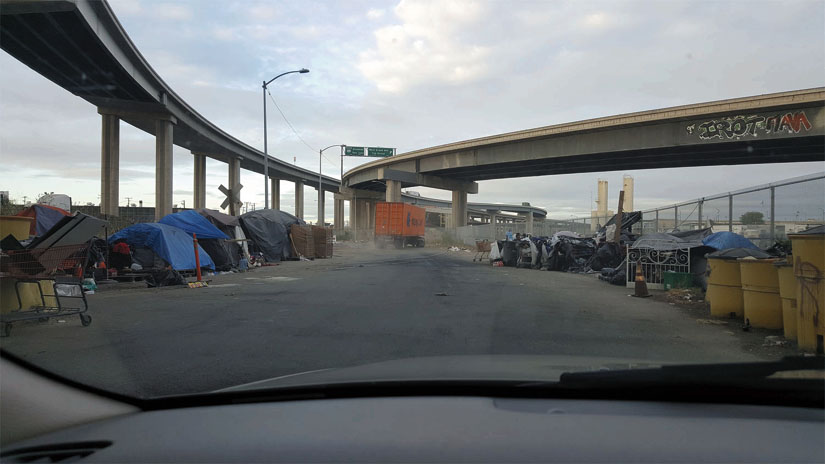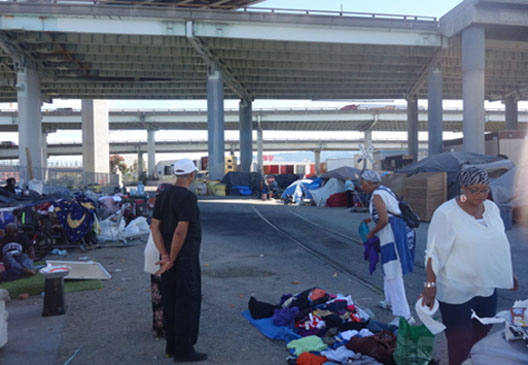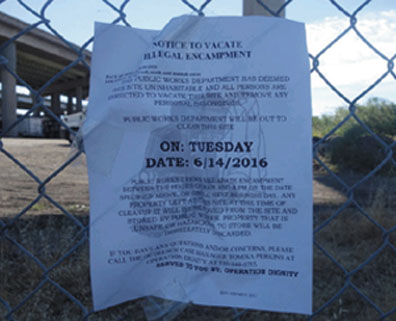
by Kheven LaGrone
People living in Oakland’s homeless encampments are residents and citizens of Oakland. Even though they live in a unique situation, they have voting rights. Each person has his or her personal story. Some have jobs but can’t find affordable housing. Some can’t get jobs. Some need medication, have health issues, or substance control problems, and some don’t. Like anyone else, people in encampments want clean and safe places to stay.
Robert is a leader in his encampment. The less attention his encampment gets, the less the surrounding neighbors will complain about their presence. He is not a criminal, but is unemployable.
Robert knows everyone in his encampment. He fears strangers bringing drugs and violence into the area, and complains about outsiders driving to the encampment and dumping trash. Not only will he and his encampment members have to live in the trash; he worries that the neighbors in surrounding homes will blame them for it.
He keeps the noise down in the encampment. Even though it is under a busy freeway overpass, he worries about bringing attention to the people who have found refuge there. When members of the Auset Movement gave brooms and garbage bags to Robert and other people living in his encampment, they cleaned the area themselves.
So I became disturbed after reading more than 200 pages of City of Oakland public emails demanding the displacement of people living in homeless encampments in Oakland. The emails dehumanized homeless people, and were written as if homeless people chose to live in those encampments and had other options.
The emails suggested criminalizing and policing people in encampments for trespassing, violating curfew or blocking a sidewalk. Such writers seemed oblivious to the reality that if the homeless person had somewhere else to go, he or she would likely have already been there. The emails were with Joe DeVries, Assistant to the City Administrator, who wrote on January 21, 2016, that he “help(s) facilitate the removal of encampments.”
Too bad Robert wasn’t included in the email discussions. He could have reminded them that he was a full citizen of Oakland. In fact, he is a native of Oakland. He could inform them that if he had a choice, he would live somewhere else.
Ironically, Robert had many of the same concerns as one of the people emailing the City. The property manager of an apartment building near Lafayette Park wrote in an email on September 17, 2015, that the park was an “unsightly mess for too long … We are sensitive to the homeless situation in Oakland, however drug use in the bathrooms and other illegal activities are a regular occurrence in this park to 3 am in the morning which pose a danger and disturbance to our residents.” He wanted the park “cleaned up.”
Then in an email on October 15, 2015, the property manager wrote: “The homeless encampment has only grown to about twice the size since my last email. My residents are scared to go into this park at night and walk their dogs … As I stated in my previous email, we are sensitive to the homeless situation in Oakland but don’t feel we need to live with the conditions that exist in this park and believe as residents of Oakland we should be able to enjoy the city parks as well.”
The people living in the encampment are residents of Oakland as well, and they should be able to enjoy the park as they choose. However, the property manager’s emails stereotyped and vilified the homeless in order to justify his demand that the City remove them. His email stereotyped them as vermin and blight that needed to be exterminated. His writing, “we are sensitive to the homeless situation,” only disguised this attack on them.
Proving that no one benefits from merely displacing human beings, in an email on January 13, 2016, the property manager wrote that people continued to come to the encampment.


“This is really starting to put a strain on our business and has cost us thousands in lost revenues in unrented apartments that look at the park. I currently have an apartment where the homeless encampment is centered on the window in the living room which has been now vacant 134 days due to the view … I have to keep trying to get things changed in the park and protect the interests of the owners.”
The property manager asked Oakland officials to assist in protecting the interests of the owners. Similarly, the people living in the encampment would want the City to assist in protecting their interests. Perhaps it is in the property manager’s and the owners’ best interests to work with their neighbors in the encampment on an equal basis. The City can facilitate that.
The property manager’s email dehumanized the people in the encampment. Even the City officials often used language that dehumanized people living in encampments in their emails. For example, in an email on January 26, 2016, the City referred to “debris abatement and homeless abatement.”
“Abatement” generally refers to trash, noise, blight and other non-human problems. Using the word “abatement” to describe the displacement of human beings is an act of dehumanization. They are people, not debris, and must not disappear or get swept or scrubbed away. The people are not to be eliminated.
But where do these displaced Oakland citizens and residents go? In several emails, the City claimed to send “outreach teams” before the “clearing.” But people were still displaced with nowhere to go.
The City and CalTrans scheduled and discussed displacements at their monthly coordination meetings. DeVries, who helps facilitate the closures of encampments, emailed me that I could not attend the July 2016 meeting because they were closed to the public. Thus, Oakland citizens and residents being displaced could not participate in the meetings where their own displacement was being discussed.
The only way to serve the homeless community is for the City of Oakland to get to know people like Robert. The City should not waste more money displacing people who have nowhere to go. Instead, the City should correct the attitude that some people are more equal than others.
Homeless people have always been here and will probably always be here. They have the right to vote in Oakland. New people have to live with their homeless neighbors. The homeless people have the right to be visible.
